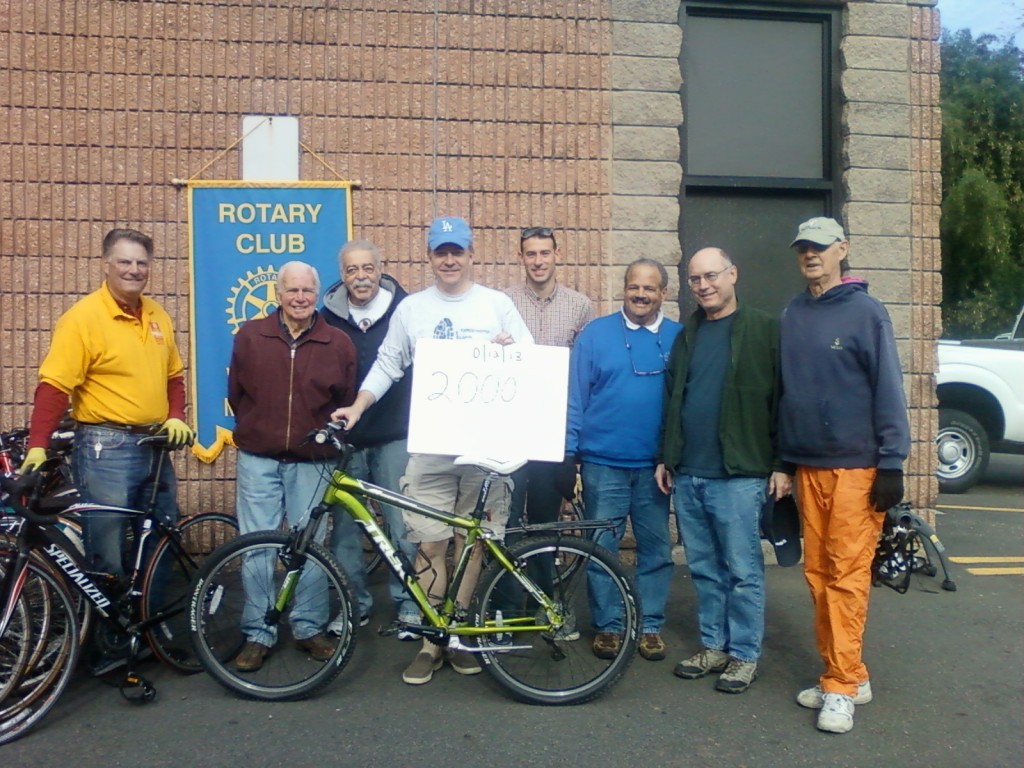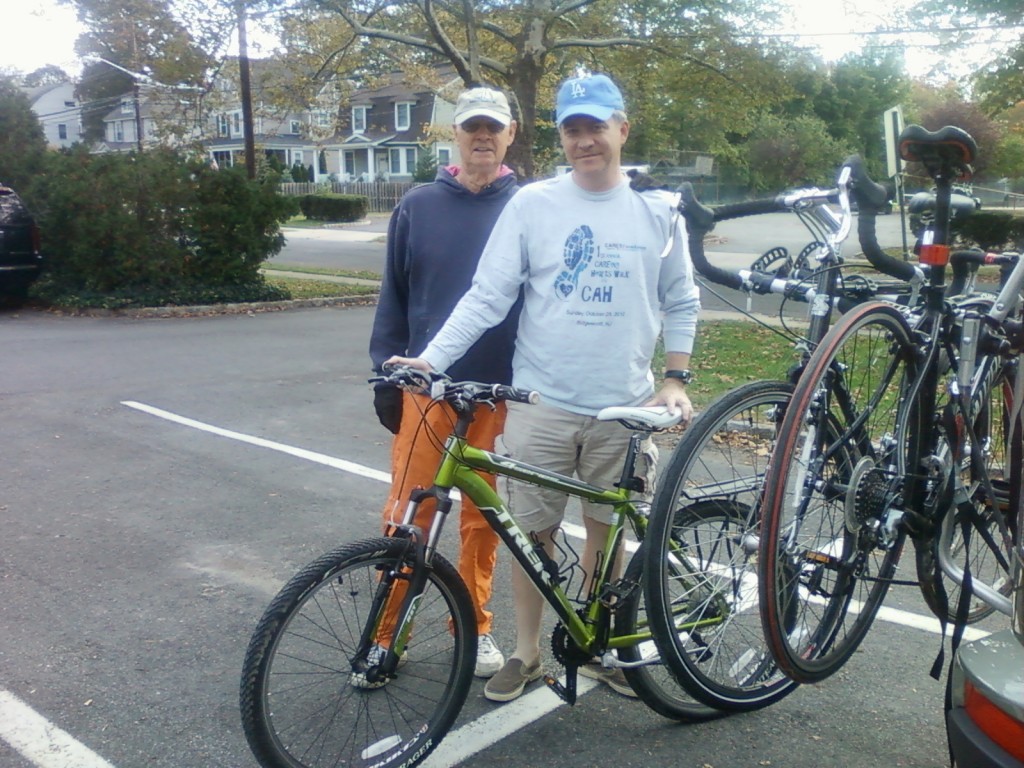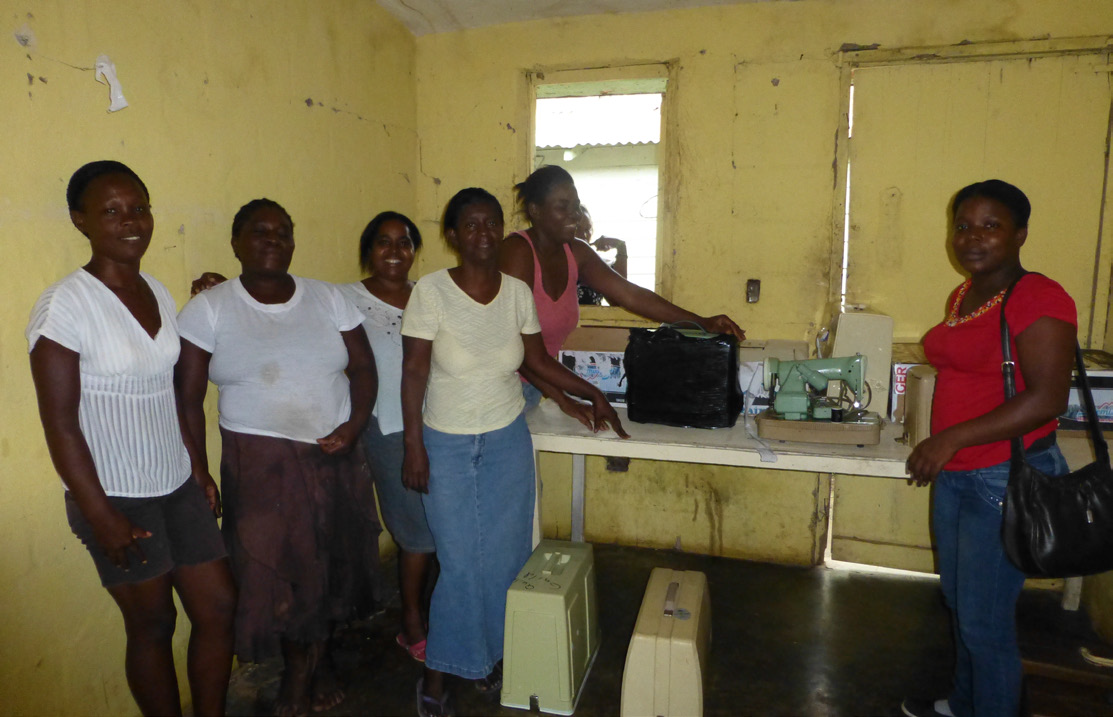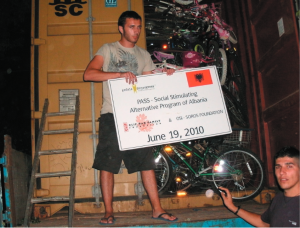All posts by admin
Westfield Rotary Collects its 2,000 Bicycle!
Country Update: Albania
by Joseph Matar
Fall 2013 InGear
Pedals for Progress’ partnership with the Social Stimulating Alternative Programs (SSAP) in Albania has led to the founding of a number of initiatives that have not only bettered people’s lives, but the country’s environment as well. The first of these was the Ecovolis bike-sharing system—based in the country’s capital of Tirana—which helps to circulate donated bicycles throughout Albania. An extension of this system, the Ecovolis Service, has built up a countrywide reputation for its reliability in the repair and maintenance of bikes.
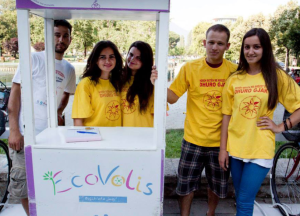
There is also the Eco Bicycle Shop, the biggest bicycle shop in Albania. In under two years, the shop has repaired, sold, and put around 2000 bikes back on the streets of Tirana, as well as other urban and rural areas. Furthermore, the shop provides training on the repairing and selling of P4P-donated bicycles to young people, thereby preparing them for employment.
One of the major goals of the SSAP is to provide jobs for members of communities in need and, so far, the SSAP has employed approximately 50 people, many of whom are students, to assist in the operation of its various services. Aside from repairing and selling bikes, 10 students earn money riding advertisement-toting bikes around for SSAP’s newest venture, Green Advertising. These used bikes have been modified to function as mobile advertisements for companies who have embraced this new, economical, and environmentally-friendly method of advertising.
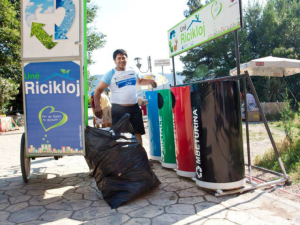
Another of the SSAP’s most recent projects that seeks to improve environmental conditions in Albania’s capital is called “I Recycle.” Typically, a method of survival for the hundreds of struggling families of the Roma community is to search through public garbage bins in order to find and collect paper, plastic, and aluminum. They then take this recyclable waste to be exchanged for a very low profit. Commonly, this process means that much of the unrecyclable waste is removed from the bins and left to scatter about the streets.
The Roma people need bicycles to transport the goods they collect as well as to efficiently check all the bins in a given area. To accomplish this, they either share a bike, using it in shifts, or, unfortunately, resort to stealing bicycles from the Ecovolis bike-sharing system. Those unable to procure a bicycle instead opt to search the tons of garbage disposed of daily in landfills. Frequently, this job is left to the Roma children, who chase the garbage trucks as soon as they are spotted, in an effort to be the first to get a chance find recyclables in the trash. Perhaps it goes without saying that these children are not attending school.
In response to these problems, the SSAP came up with “I Recycle,” a multi-part, long-term solution. First, over 100 bicycles were donated to the Roma community in Tirana, markedly reducing the number of bicycle thefts as well as moving toward eliminating the need for children to chase garbage trucks and make visits to landfills. Second, to put an end to all of the digging around in bins and to reduce the amount of litter on the streets, the SSAP manufactured and distributed color-coded garbage bin structures around Tirana. Each of the structures is divided into four bins: one for paper, one for plastic, one for aluminum, and one for other waste. With their new bicycles and the recyclables now already properly divided up, the Roma people can make their collections more quickly and simply, thus increasing their incomes.
The eventual goal, however, is to systemize this practice and provide the Roma people with long-term occupations. Working with the municipality of Tirana, the SSAP has begun this process by employing the Roma and providing them with cargo bicycles specifically constructed for the collection and transport of recyclable materials. The money collected from exchanging these recyclables is then put toward the employees’ salaries and the maintenance of their bicycles. Only adults are employed as the SSAP strictly forbids the use of child labor. In adopting this system, Tirana is gradually becoming one of the first cities worldwide that has a recycling process based entirely on bicycle transport, helping to reduce the need for and pollution from huge garbage trucks.
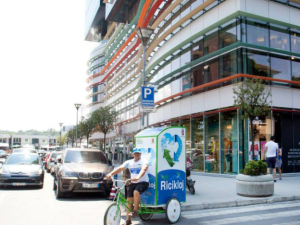
Sinan and Neritan were the first of the Roma community to become employees in the “I Recycle” program. Previously, their families would scrounge through landfill garbage, ultimately not earning even half of what Sinan and Neritan earn now. It gives them great pride to be able to begin new lives for their families and to be a part of the cause toward making Tirana a cleaner city. Furthermore, with the SSAP taking a strong stance against child labor, a condition of this employment is that the children of families with employees in the SSAP begin attending school. It is clearly fundamentally wrong for a childhood to be spent scavenging in landfills. This problem is increasingly being phased out as Sinan, Neritan, and other members of the Roma community can now provide their sons, daughters, sisters, and brothers with the educations they deserve.
None of this would have been possible without the donations of used bicycles from the American people that have been shipped to Albania by Pedals for Progress for over three years. The partnership between P4P and the Social Stimulating Alternative Programs was originally begun in 2010 with the goal of reintroducing bicycles to an automobile-centric society in order to decrease pollution and provide citizens with a healthy transportation alternative. However, this initial goal has been greatly expanded upon with bicycles being distributed throughout rural and urban areas, providing assistance to those in need. Companies are even finding the bikes to be useful as vehicles for advertising. Moreover, formerly a completely non-recycling community, the capital city of Tirana is making great strides toward accepting and adapting to the “I Recycle” system. In doing so, living conditions have improved and previously needy people have found employment.
The progress is encouraging and has fostered interest from other needy communities in Albania. However, in order to spread the “I Recycle” project and create more jobs countrywide, contributions and bicycle donations remain as vital as ever. With every bicycle donated, there is the potential for more successes—like those of Sinan and Neritan—in Albania. Every bicycle means one more opportunity to liberate a child from days spent fruitlessly scouring landfills for a few recyclable goods to instead give them a proper education and hope for a better life.
How can a bicycle improve school attendance by female students?
This paper recently came to our attention: Cycling to School: Increasing Secondary School Enrollment for Girls in India
Esi and her school transport
 Esi is a teenager who lives in a small village in the Nkwanta North District of the Volta Region. She is a student at Nkwanta Senior High School. The school is located so far away from where Esi lives that it would take her two hours to walk there. With the school day beginning at 7AM, Esi had no choice but to be up every morning well before 5 in order to be sure to get to class on time. Furthermore, the road she travels on is frequently a busy one, making her daily trek all the more arduous and slow-going. All of these factors contributed to Esi’s fatigue, which was obviously detrimental to her health, especially at a developmental age. It also made it difficult for her to be attentive during school and hard for her to dedicate energy to schoolwork in and out of class. After receiving her bicycle from WEBike, Esi found she was able to negotiate the distance between school and home within an hour, sometimes even managing it in 45 minutes. She is no longer unnecessarily exhausted and is sure to be on time, prepared, and fully alert in class each day.
Esi is a teenager who lives in a small village in the Nkwanta North District of the Volta Region. She is a student at Nkwanta Senior High School. The school is located so far away from where Esi lives that it would take her two hours to walk there. With the school day beginning at 7AM, Esi had no choice but to be up every morning well before 5 in order to be sure to get to class on time. Furthermore, the road she travels on is frequently a busy one, making her daily trek all the more arduous and slow-going. All of these factors contributed to Esi’s fatigue, which was obviously detrimental to her health, especially at a developmental age. It also made it difficult for her to be attentive during school and hard for her to dedicate energy to schoolwork in and out of class. After receiving her bicycle from WEBike, Esi found she was able to negotiate the distance between school and home within an hour, sometimes even managing it in 45 minutes. She is no longer unnecessarily exhausted and is sure to be on time, prepared, and fully alert in class each day.
Sewing Machines for El Caño
by Patricia Hamill
Fall 2013 InGear
High rates of unemployment, alcohol abuse, and teenage pregnancy. Little or no access to free or inexpensive transportation to good schools and employment opportunities. Our inner cities and rural areas are locations of potential concern for us, but, with multiple petitions, appeals to government officials, and perhaps celebrity involvement, communities may very well gain financial allotments for educational and environmental programs that enable at-risk youth to climb out of fiscal uncertainty and create financial independence. But what if the country is not large or powerful enough to compete for international attention of consequence or if the bedrock of the growing economy such as tourism and retail is not of benefit to those in remote locations? What if international celebrities have overlooked a place in need in their quest for the highest return on their sponsorship? The solution to the cycle of poverty must rest solely on a community’s ingenuity, savvy entrepreneurs, and established nonprofits who work in remote areas or small countries that don’t often rate primetime news coverage.
In the Monte Plata region of the Dominican Republic, the rural community of El Caño is in the process of developing its own sustainable niche in the economic development of this country. The financial divide here is not unfamiliar.
According to the 2013 Index of Economic Freedom, published by the Heritage Foundation with the Wall Street Journal, “Corruption, wasteful government spending, and unreliable electric service reduce investment returns, driving high unemployment.” Much of the country’s wealth is not trickling down.
The community of El Caño had, at one time, a functioning sewing project in place, but this ended when the partnership with the NGO dissolved. Then came the students of Boston’s Northeastern University who visited El Caño as part of their Social Enterprise Institute’s (SEI) Innovation Consulting Project. Students conducted an asset map and quickly learned about the community’s needs in order to increase their marketable skills and income.
As a result, the idea for the Cooperativa de Costura de El Caño (CCC) was born. The students then developed a partnership with the nonprofit MOSCTHA (Socio-Cultural Movement for Haitian Workers). Originally formed to focus on human rights, advocacy, and infrastructure services for oppressed Haitians, MOSCTHA has expanded it’s work in “improving and empowering underrepresented communities” to the Dominican Republic.
To replace the sewing machines that departed with the previous NGO, Pedals for Progress has stepped up to the plate and arranged delivery of 13 sewing machines for the approximately 28 sewers who range from younger to older men and women. All are welcome to join the co-operative. When the CCC reached out to P4P, they requested foot-operated manual machines. This would logically be in consideration of unreliable electric power and thus be another way to avoid pitfalls to production schedules and project development. Unfortunately, at the time of this writing, P4P could only find one to send them.
Once the sewing machines arrive, output of products like table cloths and school uniforms can resume and the members of the CCC will return to selling their goods to neighboring communities and even to people in Santo Domingo, the capital of the Dominican Republic. Catalogs of the co-operative’s products, created by participating Northeastern students, will enable the CCC to promote more goods to a wider segment of the population. This income will gradually empower their younger generation by providing access to higher education, gainful employment, and comfortable and safe living conditions.
This type of sponsored self-sufficiency looks to be a promising antidote to the socioeconomic pitfalls poor and uneducated people must overcome in order to enjoy the advantages many of their fellow countrymen already have. Thanks to the partnership and cooperation of the students of Northeastern University, MOSCTHA, and P4P, the men and women of El Caño have and maintain gainful employment and the dignity and respect that comes from participation in your present and control over your future.
The Great 100 Charity Ride
The Great 100 Charity Ride has three mileage options of 38, 62, and 100 miles. The ride is fully supported, including designated Rest Stops.
-
Sunday, September 8, 2013
6:30 AM to
-
1333 S. Prospect St., Nanticoke, PA (map)
Ride the challenging 38 Mile Option, the 62 Mile Option (Metric Century), or the full 100 Mile Option (Full Century).
This year’s ride benefits Pedals for Progress.
https://www.p4p.org
Start / Finish @ Luzerne County Community College
1333 South Prospect Street Nanticoke, PA 18634
Minimum Suggested Donation: $25.
Registration Opens @ 6:30am
Ride Starts @ 8:00am
——————————————————————
Ride Maps, Cue Sheets, GPS Downloads here:
38 Mile Option
http://ridewithgps.com/routes/2939423
or http://www.mapmyride.com/routes/view/254048019
——————————————————————
62 Mile Option
http://ridewithgps.com/routes/1414795
or http://www.mapmyride.com/routes/view/126295185
——————————————————————
100 Mile Option
http://ridewithgps.com/routes/1414777
or http://www.mapmyride.com/routes/view/126296947
——————————————————————
http://www.meetup.com/UpstateVelo/events/130805082/
Bikes Take Root in the Balkans
by Jola Foto
Spring 2011 InGear
Throughout the cities of western and northern Europe public bicycle services have been established that encourage and increase the use of bicycles as healthy and ecologically-sound transport. Through these services subscribers can rent bikes in easily accessible locations throughout the city and when finished return them to any other convenient station in the network. PASS has long wished to emulate this type of system in Albania and by the end of December, 2010 we will have four stations set up around Tirana, the capital. Tirana Community Bicycle, the first bicycle-sharing program in the Balkans, is an initiative of the PASS organization undertaken with funding support from the Open Society Foundation of Albania (OSFA is a Soros Foundation democratization program for Albania) and a generous contribution from Pedals for Progress, which donated the first 500 bicycles. Thanks to P4P’s contribution, our project was implemented and we were encouraged to advance and expand it.
The city of Tirana, and especially its center, is quite suitable for transportation by bicycle. The downtown area is dense, the terrain is flat, and the climate is mild. The short distances and easy conditions make cycling a fast and practical way of moving in the center of the city, and may be the best means of meeting the needs of the citizens of Tirana.
Given the heavy traffic situation in the center of the city and air pollution from CO2 emissions, we believe that this service will be a valuable contribution to the community. PASS has been promoting the new system for some time before the placement of the public bicycle stations. In the course of our other social activities, and in conjunction with our P4P-supported bike retail shop EcoVolis, we have involved the citizens of Tirana by soliciting suggestions regarding form, logo, and slogan. We have also organized awareness activities with the young people of Tirana. For instance, on September 22nd, a national activity day called “A Day Without Cars,” we distributed over 200 bicycles in the Youth Park, Mother Theresa Square, and the Ministry of Education for the “transport by bicycle” learning activity. In January, we will donate 30 bicycles and organize bike training for the children.
We hope that the Tirana Community Bicycle service will be properly consolidated in 2011, with a targeted number of daily uses of the public bicycles by citizens. By doing this we wish to promote the use of bicycles as a mode of transport for commuting or performing other daily activities and increase their use in our city.
A Loss in the P4P Family – Floyd Merchant
Please join us in sending our sympathies to Beverly Merchant due to her recent loss.
In lieu of flowers, memorials to:
ASPCA
PO Box 96929
Washington, DC
20090-6929
Freedom House
3 Pavillion Road
Glen Gardner, NJ
08826.
Floyd S. Merchant

Floyd S. Merchant, age 80, of Clinton, NJ passed away on Wednesday, June 19, 2013 at home after a long illness.
He was born on December 3, 1932 in Woodcliff Lake, NJ. He lived in Clinton, NJ for 32 years, moving from Pattenburg, NJ.
He was the son of the late Floyd S. and Marion Lunan Merchant.
He was the husband of Beverly Blumberg Merchant, celebrating 32 years of marriage.
He was a retired Sargent 1st Class in the US Army. He served in the US Air Force, completing 2 hitches in the Air Force and was also in the National Guard. He retired from the Army Reserve as a SFC.
Mr. Merchant graduated with 2 Bachelor’s Degrees; one from Ricker College in mathematics and one from Edison College in psychology. At age 70, he completed his Master’s Degree in Neuropsychology from Saybrook University in San Francisco, CA.
He operated his own alarm installation service “Hunterdon Security”, installing security alarms in the Hunterdon County area. Floyd was also an Electrical and Mechanical Engineer at Bell Labs in Whippany, NJ. In the last 15 years, he worked as a security guard at Foster Wheeler in Perryville, NJ.
Survivors in addition to his wife include 2 sons; Daniel White and his wife Retha of Missouri and Arthur H. Merchant of Basking Ridge, NJ. 1 daughter; Susan Walsh. 1 step-son; Kenneth Stern and his wife Sandra of Sandy Hook, VA. 4 grandchildren; David Walsh, John White, Samantha Stern and Cassidy Stern.
Calling hours will be Tuesday, June 25, 2013 from 2-4 and 7-9pm. Funeral Service will be Wednesday, June 26, 2013 at 10am. All at Scarponi-Bright Funeral Home, 26 Main Street, Lebanon, NJ. Interment will be private.
In lieu of flowers, memorials to ASPCA, PO Box 96929, Washington, DC, 20090-6929 or Freedom House, 3 Pavillion Road, Glen Gardner, NJ 08826.
52nd Container to Rivas
May 18th, 2013, marked the shipment of the 52nd container of bicycles to EcoBici in Rivas, Nicaragua. Our relationship with this organization is the longest in our 23 years of partnership building. This current delivery contains 580 bikes that add to the 22,044 cycles already in circulation in the region and will contribute to the organization’s goal of community development and focus on enabling much-needed reforestation in the region.
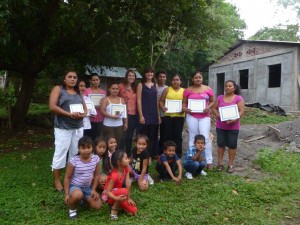 P4P is also pleased to add 6 sewing machines to the container shipment. Our readers are of course already familiar with the Clif Bar Family Foundation’s steady and generous support of our programs and so it is not unexpected that the shipping and import taxes have been covered by them. What is new here is that the sewing machines are destined for a different locale in the region. In April, we were contacted by Noelle London, a Peace Corps volunteer who is involved in small business development in Nicaragua. London wrote that she lives on Ometepe, an island close to Rivas. This island, situated on Lake Nicaragua, is steadily becoming a tourist destination and she informed us that, currently, most of the souvenirs visitors purchase there tend to be made in Granada or Masaya.
P4P is also pleased to add 6 sewing machines to the container shipment. Our readers are of course already familiar with the Clif Bar Family Foundation’s steady and generous support of our programs and so it is not unexpected that the shipping and import taxes have been covered by them. What is new here is that the sewing machines are destined for a different locale in the region. In April, we were contacted by Noelle London, a Peace Corps volunteer who is involved in small business development in Nicaragua. London wrote that she lives on Ometepe, an island close to Rivas. This island, situated on Lake Nicaragua, is steadily becoming a tourist destination and she informed us that, currently, most of the souvenirs visitors purchase there tend to be made in Granada or Masaya.
London informed us that, with reliable and efficient tools, the local women could develop a thriving base of manufacture in their community of Balgüe: “They have begun to sell in a couple of locations on the island and even in a fair in Managua but are unable to keep up with the current demand as they only have 3 working machines.”
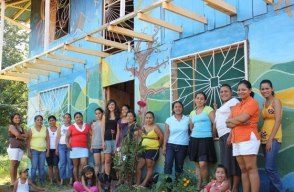
This region is ideal for building a tourist trade in local crafts as there are many attractions to draw steady crowds yearly. The beaches on the island of Ometepe are black volcanic sand, and the lake, long separated from the ocean by an earthquake, is an ideal location to observe the many species who have adapted to this environment. Lake Nicaragua is the only lake in the world with very large freshwater sharks. Tours of the island include trips to Altagracia and its Pre-Columbian stone statues and to Magdalena Farm in Balgüe where organic coffee is grown. It is a lush land with fertile soil fed from the Volcano Maderas.
London included this statement in her e-mail to us: “I have normally been the one to shy [local women] away from donations, as they have to eventually [establish] a fully sustainable business as opposed to a project. However, after working with them on productivity countless times, I have come to understand that they simply lack the sufficient resources to really take off.” What stands out to us at P4P is London’s very realistic take on the development of self sufficiency. Charity does not build business infrastructure. Long-term goals, reliable tools, and ongoing training programs are the only hope for people in places like Ometepe to foil the existence of questionably sourced “authentic” souvenirs of their own region and take control of the industry for themselves. This is a beneficial situation for visitors of the region as well, of course. Value is added to the experience of visiting a country where the textiles and other mementos are made by local people and cooperatives. Even better if a visit to the places of manufacture are part of a tour itinerary.
“It has been a pleasure to work with these motivated and talented women. They have dealt with countless obstacles and have continued to fight to keep their business afloat,” states London. P4P is very happy to see the contents of one container contribute to an old reliable partnership in Rivas and a new and promising one on Ometepe.

